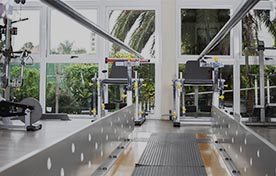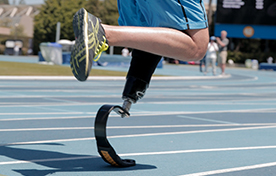When Our Roles Change From Caregiver to Receiver
After I got married, I opted to stay at home for my stepson. During those years I ended up using my professional caregiving skills to help my family through many ordeals. I took care of my husband after our motorcycle accident. I took care of my aging grandmother. I took care of my stepmother during her cancer treatments. And for 6 years I was my father’s caregiver after he was diagnosed with congestive heart failure and then lung cancer during the last year of his life.
During that last year, I was also learning how to be a patient myself and how to let my husband be a caregiver to me. In April 2002, I was hit by an 18-year-old driver. That accident changed my life forever and is how I became an amputee. I instantly went from being the person who was caring for everyone else to being the person who was cared for. After spending several months in the hospital, I was released with a wheelchair and a walker. I spent another 7 months undergoing physical therapy. Because of fractures in my shoulder blade and collarbone, I wasn’t able to use crutches. That was the beginning of a new journey: accepting that the roles had changed.
Being the patient wasn’t too hard while I was in the hospital, but it was difficult at home. As a trained caregiver, I was familiar with how to take care of someone at home, but being cared for was another story. It’s very hard, especially when you have been the caregiver, to allow someone else to do things for you. I knew what needed to be done, but my body wouldn’t allow me to do it.
Sitting on the sidelines watching someone cook, clean and care for me wasn’t easy. Two days after I was released from the hospital, I was figuring out how to make the bed from a wheelchair. I would get frustrated watching my husband, Jon, try to do something, so when he wasn’t looking, I would start the laundry, or dinner. The fact is that, after months of being in a hospital bed, I was very weak. I would start projects, but not be able to complete them. As soon as Jon would return from taking care of my father, he would then have to finish what I had started. In reality, I was making his job a little harder because it was disrupting his daily schedule.
Having the knowledge of how to use a walker, cane, wheelchair, crutches or other medical devices wasn’t a problem for me. Having patience with someone who didn’t know was another story. It takes patience to remember that others might not know how to use them and are learning. It takes patience to explain it to them as well. Knowing how important wound cleaning is, it was tough to keep my patience. I would notice when someone inadvertently touched something and know that they were going to have to start the whole process over again. In moments like this, it helps to remember that the person loves you and is only trying to help. It’s also important to remember to give them the time they need for their daily routine in addition to helping you. One of the biggest obstacles for me was having to take Jon’s word about my father’s health at that time. He was the caregiver to two people, in two separate houses, and it was really hard for me to trust that he was observing and taking care of all of his needs, which I couldn’t do. I tried not to interrogate him, but I’m sure I probably did.
Dealing with a loved one’s frustration or your own, coping with pain after surgery, learning how to don a prosthesis and how to walk again — all can lead to short tempers. Some days my husband and I had our share of them. For me, it was triggered by watching someone else do the things that I had done on a daily basis. For Jon, it was dealing with me not wanting to be taken care of.
I asked Jon one day if I was being a burden to him and what the hardest part of taking care of me was. His reply was that his frustration came from the fact that he was only trying to help, and it seemed like when it came to wound cleaning or any type of bandage, I always tried to do it myself. It left him feeling like he wasn’t doing anything, when, in my eyes, I was only trying to keep him from doing so much.
I spent some time that afternoon thinking about that. I had gone from being wife, stepmother, daughter and caregiver to simply being a patient. During the course of that afternoon, I came up with a few rules for myself.
- Be patient with yourself.
- Be patient with your caregiver.
- Always be kind if you see your caregiver doing something incorrectly.
- Make gentle suggestions instead of criticizing.
- Remember that caregiving might be new to them.
- Don’t forget to laugh with them.
From then on, I tried very hard to avoid finding fault with how things were done. I didn’t try to do too much myself if I wasn’t sure I could finish what I started. Keeping my dressing sterile was my main priority. If dishes sat in the sink for a half hour after dinner while Jon did something else, I learned to let it go. If our bed wasn’t made right away, I let that go too. It usually got made at some point during the morning. After all, he was patient enough with me when it took me 20 minutes to walk 500 feet to my father’s house. I could choose to be patient about the disruption of my normal routines. I could choose to focus on the things that I could do, such as taking care of paying bills, calling our insurance provider (which always seemed to take a long time), or scheduling physical therapy sessions, doctor appointments or any of the dozens of other appointments that were necessary for my full recovery.
Speaking as the person who was being cared for, I can say that we tend to want to resume our normal routines as soon as possible, which is understandable. For me, as a caregiver prior to my accident, this feeling was escalated by my desire to help my father’s failing health at that time. Everyone has their own circumstances, but finding patience, kindness and humor makes it easier to be the receiver of care instead of the caregiver. It’s important to remember that life will resume; it’s just a matter of taking the time to allow ourselves to properly heal. Sometimes, allowing someone to help us with our needs helps them as well, especially if it is a loved one.
Disclaimer: The following information is provided and owned by the Amputation Coalition of America and was previously published on the website http://www.amputee-coalition.org or the Coalitions Newsletter, inMotion.








